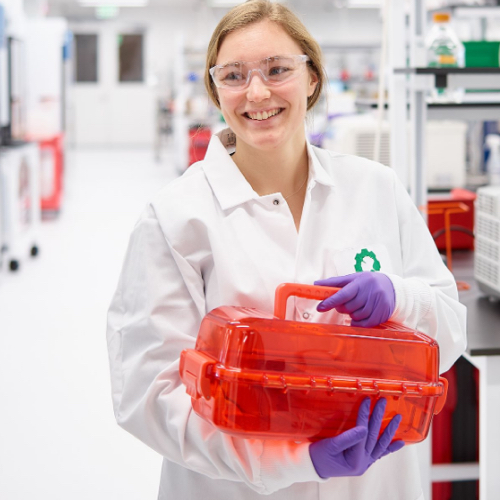Ginkgo’s Protein Services leverage a diverse technological platform to provide support our partners’ R&D.
Sneha Srikrishnan, Senior Director of Business Development at Ginkgo, discusses how Ginkgo’s business model customizes partnerships to align with the developmental stage of partners’ products, offering tailored R&D services from strain engineering to fermentation optimization.
Humans of Ginkgo Bioworks is an interview series featuring Sudeep Agarwala interviewing some of the brilliant folks at Ginkgo to learn more about the technology that makes our work possible.
Sudeep Agarwala: Sneha, you’ve been at Ginkgo more than seven years and have done everything from strain development workflows in the foundry all the way to talking to customers about how Ginkgo approaches protein expression issues.
Sneha Srikrishnan: Well actually, I’ve been thinking about protein production for my entire professional career–I researched this as a graduate student and postdoc and you’re right–when I first came to Ginkgo, I was working on developing a lot of the early workflows in the foundry for engineering different types of yeast. It’s been incredibly gratifying seeing those workflows grow into what Ginkgo’s offering now and it’s also why I’m so eager to talk about Ginkgo’s place in protein production in my current role in business development at Ginkgo.
SA: I know you’ve talked here about how Ginkgo works with partners in the protein space. I’d like to get a sense of how the partnering work–an earlier-stage product may have a very different scope of work associated with it than a more mature product that is already out on the market. So how does a company’s stage in R&D play a role in how we partner with them?
SS: We’ve thought about how to work with a wide range of partners in the protein space and the different stages of products that they’re working on. You’re right that early-stage products may require more extensive R&D in terms of strain engineering or other aspects of product development. Add to this, many early-stage products, either at start-ups or at larger, more established companies, may not have a lot of cash to outsource R&D–either because people are working on these early-stage products as a preliminary proof-of-concept to see if it has legs or because people are still working on funding for their company.
Late stage products can have a different scope associated with them. And by this, I mean, projects that are already on the market, so maybe there’s less strain development and more emphasis on fermentation optimization, processing, with less of an emphasis on strain engineering.
In my previous conversation, I’ve talked about how Ginkgo’s Protein Services’ Offerings are aimed to help projects at a wide variety of stages. But there’s another important point to discuss here in terms of how we try to maintain flexibility in our business model with these service offerings, and structure it so that we are tying our success to the success of our partner.
In general, we divide the cost of a project into two buckets. There’s an R&D fee, which we don’t generate margin from. The second bucket is downstream value–and this is where we tie our success to the success of our partners.
Realizing downstream value can be in the form of royalties on sales, a flat percentage of revenues, lump-sum payments on commercial milestones, or any combination of these. Or, for whatever reason, if it doesn’t make sense to have this payment tied to sales, we’ve been able to find ways to solve these situations as well–single payments, or a single payment broken up into different chunks; we try to be flexible on how this downstream value is realized and we try to work with our partners on how this can work.
What I’m trying to emphasize here, though, is that Ginkgo wants our partners to be successful, and that we’re willing to work with our partners to index on that success.
SA: I think maybe you’ve answered this question indirectly, but I want to make sure: when does it make sense to come work with Ginkgo versus, say, a CRO?
SS: I like this question because I get it in different ways from many potential partners. I think of it like this: companies can go to CROs with a very defined service that they are looking for–in many instances, this is the kind of work that companies have the capability but not the bandwidth to do or can’t justify the expense to do in-house for a project that might be in its very early stages.
Ginkgo’s cell engineering platform is different. The goal of developing this platform is to bring a wide range of technologies to bear on a single project; and in some cases we’ve combined part of the platform into our Service Offerings, which makes sure that we’re providing state-of-the art technology on our partners’ R&D.
SA: And, I suppose, there’s an effect of streamlining the work through Ginkgo in these Service Offerings, versus having to coordinate with a lot of different CROs or academic groups.
SS: Exactly–there are efficiencies when you’re bringing a product to market with Ginkgo, and this is what makes it a great place for companies interested in end-to-end research and development. In progressing your project from early stages–discovery or early strain development–all the way to fermentation optimization and scale-up, there’s an efficient knowledge-transfer that comes between the different teams working on your strain that can really shave a lot of time off your commercialization process. Imagine if instead you have to tech transfer from and to a different CRO every time you needed to move to the next stage of your project.
And there’s one other point that I think is worth mentioning here–that efficiency brings with it flexibility. Let’s say for example you’re developing a strain using rational engineering methods and are hitting a wall with reaching the target titers. Ginkgo can quickly move to unbiased engineering methods without having to identify a partner who can do this work. We know how to do this quickly because they are already part of our broad platform: the teams for rational engineering and unbiased engineering collaborate to provide new direction to the project (sometimes they’re even the same people). And this is how we can quickly shift gears to this new direction in the project.
We think about this efficiency in our platform in terms of “more shots on goal” at making a project successful. I think this is something to really emphasize: you can potentially mitigate a lot of technical risk by working with Ginkgo. Having many workstreams easily accessible in one place allows you to try different things quickly as you move forward to commercialization. And at a place like Ginkgo, we’re there to support the development that needs to happen so you can focus on the product-facing work needed to commercialize your protein.
 Sneha Srikrishnan is Senior Director, Business Development at Ginkgo Bioworks, leading Protein sales & Product management. She previously served on the technical team of Ginkgo as a Sr. Director of platform technology for enzymes and protein production. Prior to Ginkgo, Sneha worked at Gevo, Inc. as a scientist developing yeasts for commercial production of isobutanol. She has over a decade of industrial experience in successfully delivering synthetic biology-based solutions within the nutrition & wellness space, in sustainable fuels, waste valorization and environmental remediation, and holds patents in these areas. Sneha graduated with a Bachelors in Chemical Engineering from the Indian Institute of Technology, Bombay and earned her Ph.D. in Chemical and Biochemical engineering from the University of California, Irvine. Sneha is passionate about food security and circularity.
Sneha Srikrishnan is Senior Director, Business Development at Ginkgo Bioworks, leading Protein sales & Product management. She previously served on the technical team of Ginkgo as a Sr. Director of platform technology for enzymes and protein production. Prior to Ginkgo, Sneha worked at Gevo, Inc. as a scientist developing yeasts for commercial production of isobutanol. She has over a decade of industrial experience in successfully delivering synthetic biology-based solutions within the nutrition & wellness space, in sustainable fuels, waste valorization and environmental remediation, and holds patents in these areas. Sneha graduated with a Bachelors in Chemical Engineering from the Indian Institute of Technology, Bombay and earned her Ph.D. in Chemical and Biochemical engineering from the University of California, Irvine. Sneha is passionate about food security and circularity.
